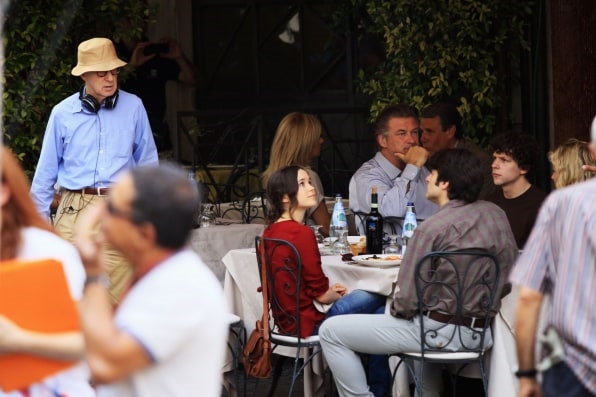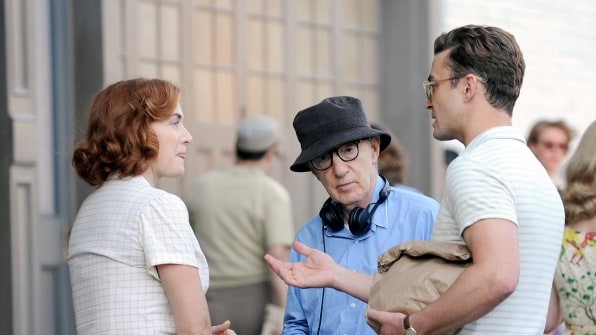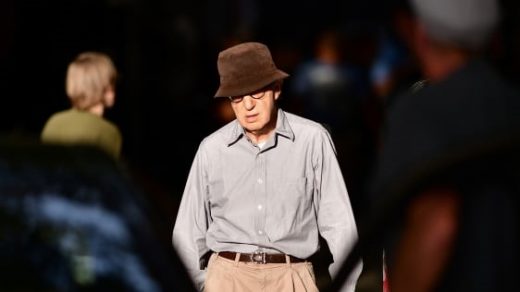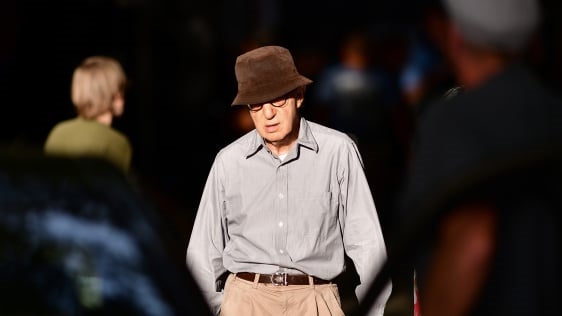Time’s Up, Woody Allen
UPDATE: Hours after Fast Company published this article, actor Rebecca Hall announced that she is ‘profoundly sorry’ for appearing in Woody Allen’s next film, A Rainy Day In New York, and that she has donated her full salary to Time’s Up, the anti-sexual harassment initiative. Previously, actors David Krumholtz and Griffin Newman, who also appear in Allen’s forthcoming film, made similar announcements, with Krumholtz donating his salary to Time’s Up, and Newman donating his to RAINN, an anti-sexual assault organization.
SECOND UPDATE: ActorTimothée Chalamet, who also stars in Woody Allen’s next film, released a statement on Monday, the crux of which is: “I have been asked in a few interviews about my decision to work on a film with Woody Allen last summer. I’m not able to answer the question directly because of contractual obligations. But what I can say is this: I don’t want to profit from my work on the film, and to that end I’m going to donate my entire salary to three charities: Time’s Up, the LGBT Center in New York, and RAINN.”
Louis CK was on the verge of releasing a movie about a Woody Allen-like figure when new revelations about the comedian’s sexual misconduct derailed his career, possibly forever. Fortunes change rather quickly in the post-Weinstein era. But the ultimate Woody Allen-like figure, Allen himself, has been making a movie a year since long before his daughter Dylan Farrow wrote a harrowing account in 2014 of how Allen allegedly molested her as a child. The uninterrupted streak continues to this day.
Lately, there have been some signs that Allen’s time might finally be up.
On Wednesday night, HuffPo published an open letter from Mira Sorvino, who won an Oscar in 1996 for her supporting role in Allen’s Mighty Aphrodite. Addressing the letter to Farrow, Sorvino expressed support for her, regret over working with Allen, and sorrow for not speaking out sooner. Her letter arrived on the same day Greta Gerwig also expressed regret over working with Allen, on 2012’s To Rome With Love, and pledged to never do so again.
Their voices suggest there is less reticence for stars to denounce or mock Allen. Are more condemnations to come? And if so, will audiences follow suit? The filmmaker’s financiers may be asking themselves this question too. Allen’s latest, Wonder Wheel was rebuffed by critics and has performed miserably at the domestic box office, racking up just $1.4 million in seven weeks of limited release–a dismal showing, even in the context of Allen’s famously spotty track record. There has long been a toxic aura surrounding the legendary director, who just turned 82, only now it may finally have become impossible to ignore or scrub away.
Like many people, it took Gerwig a long time to arrive at an unequivocally negative position on Allen. She drew some criticism after Sunday’s Golden Globes for deflecting the oft-asked question of how she feels about him. She ended up in tears on NPR’s Fresh Air last fall, trying to find a way to honor an accuser in the post-Weinstein climate without completely disavowing her former hero. In contrast, Gerwig’s To Rome with Love costar Ellen Page minced zero words last fall when asked about appearing in that film. She called it the biggest mistake of her career.
“I am ashamed I did this,” she wrote on Facebook. “I had yet to find my voice and was not who I am now and felt pressured, because ‘of course you have to say yes to this Woody Allen film.’”

[Photo: Ernesto Ruscio/Getty Images]
Much has changed since Gerwig and Page appeared in To Rome with Love five years ago. Anybody familiar with Allen has known for decades that he married his partner Mia Farrow’s adopted daughter, Soon-Yi Previn, and that his movies often feature ineffectual Allen surrogates lusting after inappropriately young nymphs of mystic charm. But in 2014, after her father received the Cecil B. DeMille Award at the Golden Globes, Dylan Farrow wrote an open letter published in The New York Times, in which she brought allegations that had first emerged in 1993 back to the forefront of the cultural conversation. Lines were drawn. Every actor affiliated with Allen was soon asked to comment on Farrow’s letter. (Scarlett Johansson: “It would be ridiculous for me to make any kind of assumption one way or the other.” Diane Keaton: “I believe my friend.”) Since there was no resolution, many fans and actors just quietly made the decision that it was okay not to believe Farrow. Allen went on to release three new films and an Amazon TV series.
The fall of Harvey Weinstein, though, and the trail of unmasked abusers in its ongoing aftermath, has given people a reason to reevaluate matters. (Indeed, one of the journalists leading the legally difficult charge to break the Weinstein story was Allen’s son, Ronan Farrow.) In a December op-ed for the Los Angeles Times, Dylan asked the men and women of Hollywood why the #MeToo movement had spared her father. One possible answer is that there have been no new Woody Allen accusers since the dam began to burst in October. Although many fans and actors on the fence must have reconsidered their (perhaps subconscious) decision not to believe Farrow, there has been no flashpoint for fresh outrage to take hold.
There may be no new accusers, but every new piece of information we learn about Allen seems damning. The journalist Richard Morgan combed through 57 years of Allen’s personal archives and found “an insistent, vivid obsession with young women and girls”–even more so than what’s already on display in his body of published work. And Allen himself, when asked to comment on Weinstein’s downfall last October, somehow ended up warning of “a witch hunt atmosphere, a Salem atmosphere, where every guy in an office who winks at a woman is suddenly having to call a lawyer to defend himself.”

Kate Winslet, Woody Allen, and Justin Timberlake on the set of Wonder Wheel
[Photo: GWR/Star Max/GC Images]
Part of Allen’s schtick is that he accepts being a pariah, but the actors who support him in this new climate now have to be prepared for that pariah-status to rub off on them. Justin Timberlake, who called working with Allen on Wonder Wheel “a dream come true” was filleted online for wearing a Time’s Up pin to the Golden Globes. Winslet incurred even more wrath for defending Allen in a bizarre interview in which she said she thinks “on some level Woody Allen is a woman.” The backlash has been intense, a warning to actors considering roles in his future projects.
Because Allen has always tended to work with modest budgets, his movies have generally ended up in the black, if not often to the extent of his biggest ever box office hit, Midnight in Paris, which grossed $151 million worldwide. Even the stinkers in the bunch (like 2008’s Cassandra’s Dream) have recouped overseas, where his films do the majority of their business. Can this pattern continue? Wonder Wheel has made $9.1 million worldwide so far and is still expanding into more countries. But the disaster of his little-seen and critically savaged Amazon series, A Crisis in Six Scenes, suggests that Allen’s audience (in the States at least) could be thinning. Studios and investors who get into business with Allen are aware that he’s a hit-and-miss legacy artist. But they aren’t in it for the goodwill. They want the prestige that comes with presenting “the new Woody Allen.” How much longer can that prestige last?
When Amazon announced Allen’s next movie last fall, it was met with a baseball-stadium wave of eye rolls. A Rainy Day In New York stars Selena Gomez and Elle Fanning–25 and 19 years old, respectively–with Fanning reportedly portraying a 15-year-old in a sexual relationship with a character played by Jude Law (who is 45). Given the conversation of the past several months, those actors are guaranteed to face tough questions from reporters when it’s time to promote the film later this year. So too can executives at Amazon Studios, which ousted its CEO last fall over sexual harassment claims.
Short of a confession, there’s no way to convince people that Allen has done the worst of what he’s been accused of. All the information is out there. He’s been the pinnacle of the debate on separating the art from the artist for decades, as Louis CK can attest. Whether it’s okay to still enjoy his classic movies is a personal decision any fan must make for themselves. Whether we continue allowing this person to make movies in this climate, rather than allocating resources elsewhere, should be decided in the court of public opinion.
At this point, the public appears to be at the tipping point of saying, “Of course you have to say no to Woody Allen films.”
Fast Company , Read Full Story
(24)














